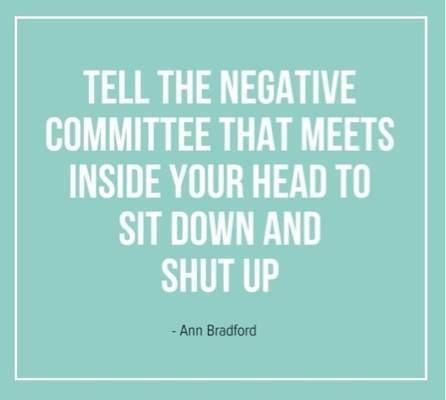Constructive self-evaluation is important because we get to reflect on things that have happened.
It also gives us insight into how we can grow and do things differently in the future.
Self-reflection is considerate and respectful inner dialogue.
Negative self-talk, on the other hand, drains our energy and confidence; triggers feelings of shame, sadness, frustration, embarrassment and hopelessness. It interferes with our progress and prevents us from moving forward.
Many studies show that harsh self-criticism causes higher levels of stress, anxiety and depression.
Now some good news! We CAN learn to speak to ourselves in a kinder and more respectful manner… but of course any change comes with practice.
Pay VERY close attention to your inner self-talk and the conversations in your head. This happens all day long and if we're not somewhat conscious of what's happening, our lives can begin to spiral.
Here are a few exercises to consider when training your mind to think differently:
(Some of these might seem a little out there, but if you stay open-minded, this could have an incredible impact on you!)
1. What would you say to a friend who is in the same situation? How would you talk to them? What advice would you give? Or… what would your best and dearest friends say to you in those moments?
2. Be mindful of your thoughts and instead of telling yourself: “I’m so disorganized!” train yourself for success, "I’m not as organized as I’d like to be so I’m going to commit to cleaning one area of my home each week until I feel more organized."
3. Give your inner critic a name… it will be hard for you to take those inner remarks seriously if you say: “Oh, here’s that old Nag again!”
Brené Brown, PhD, a research professor at the University of Houston Graduate College of Social Work and author of The Gifts of Imperfection, calls hers “The Gremlin”.
4. Shame breathes 3 things: fear, blame and disconnection. If you have any of these emotions running around inside your head, find the courage to call someone and talk about it! Make sure this person is supportive, and you’ll probably end up feeling a lot better and possibly even laugh about it.
5. Embrace imperfection! Realize deeply that there’s nothing interesting about being perfect.
You know what else? No one ever inspires others by being bulletproof, but their willingness to mess up and try again!
Vulnerability is key to deeper connection.
I want to encourage you this week to change your inner-self talk to something empowering and positive.
First, just become aware of the conversation going on in your head, and then use the strategies above that resonate with you to help shift the conversation.
Keep in mind this is something we ALL struggle with at some point or another.
Committed to your health,
Kendrick
It also gives us insight into how we can grow and do things differently in the future.
Self-reflection is considerate and respectful inner dialogue.
Negative self-talk, on the other hand, drains our energy and confidence; triggers feelings of shame, sadness, frustration, embarrassment and hopelessness. It interferes with our progress and prevents us from moving forward.
Many studies show that harsh self-criticism causes higher levels of stress, anxiety and depression.
Now some good news! We CAN learn to speak to ourselves in a kinder and more respectful manner… but of course any change comes with practice.
Pay VERY close attention to your inner self-talk and the conversations in your head. This happens all day long and if we're not somewhat conscious of what's happening, our lives can begin to spiral.
Here are a few exercises to consider when training your mind to think differently:
(Some of these might seem a little out there, but if you stay open-minded, this could have an incredible impact on you!)
1. What would you say to a friend who is in the same situation? How would you talk to them? What advice would you give? Or… what would your best and dearest friends say to you in those moments?
2. Be mindful of your thoughts and instead of telling yourself: “I’m so disorganized!” train yourself for success, "I’m not as organized as I’d like to be so I’m going to commit to cleaning one area of my home each week until I feel more organized."
3. Give your inner critic a name… it will be hard for you to take those inner remarks seriously if you say: “Oh, here’s that old Nag again!”
Brené Brown, PhD, a research professor at the University of Houston Graduate College of Social Work and author of The Gifts of Imperfection, calls hers “The Gremlin”.
4. Shame breathes 3 things: fear, blame and disconnection. If you have any of these emotions running around inside your head, find the courage to call someone and talk about it! Make sure this person is supportive, and you’ll probably end up feeling a lot better and possibly even laugh about it.
5. Embrace imperfection! Realize deeply that there’s nothing interesting about being perfect.
You know what else? No one ever inspires others by being bulletproof, but their willingness to mess up and try again!
Vulnerability is key to deeper connection.
I want to encourage you this week to change your inner-self talk to something empowering and positive.
First, just become aware of the conversation going on in your head, and then use the strategies above that resonate with you to help shift the conversation.
Keep in mind this is something we ALL struggle with at some point or another.
Committed to your health,
Kendrick



 RSS Feed
RSS Feed


